In “Servo di Dio Padre Rocco Ferroni. Un umile ed esemplare figlio di San Camillo”
“Let’s be saints”. This is a phrase that we encounter every now and then on the lips of Father Rocco and they tell us a little about the burning desire for perfection that devoured him. His conduct will illuminate us about him more than his words. His spiritual life was rich in virtues and here we may list some of them.
HUMILITY
Father Rocco was truly humble. The pathway followed by Father Rocco, the foundation of his humility, was imitation of Jesus: Christ is the Way, the Truth and the Life, and nobody goes to the Father unless by way of him. And Father Rocco in the exercise of this virtue organised himself in the following way: he placed his life under the gaze of God, feeling all of His greatness, His omnipotence, convinced that all the good that was in him was the work of God and all the bad his own work.
His confreres provide the following testimony: ‘His humility was heroic: he even seemed to flee from his own shadow’. ‘I have never heard Father Rocco say one word in praise of himself, or an allusion that touched self-love, however much he was esteemed by those who knew him’.
But where perhaps, more than anywhere else, he exercised the appeal of his humility, which was expressed with great tenderness, was in the confessional. We have asked ourselves why so many people, belonging to the most varied social backgrounds – seminarians, priests, ordinary women, men belonging to the nobility, as well as all kinds of sick people – turned to Father Rocco. None of his penitents managed to provide us with an answer. It appears to us that we can understand the reason for this fact by referring to ‘that humble certainty’ with which he managed to guide souls.
In the confessional, he felt that he was nothing else but a minister of grace, an instrument of the mercy of God, and those who drew near to him heard the Lord. This is because a humble soul acquires such transparency that it communicates God.
SILENCE
‘He spoke a great deal with God and not very much with men’. This is perhaps the phrase that most captures the physiognomy of Father Rocco because it places that physiognomy in an attitude that was habitual for him, that is to say the wish to live in intimacy with God.
In this, he was a faithful son of St. Camillus, of whom we read: ‘The practice and the habit of good thoughts made Camillus taciturn. Outside hospitals, where charity made him expansive, he was a man of few words. Silence for him was prayer, a marked saving of time, insurance against many defects which those who speak too much do not avoid’.
Father Rocco was a model of silence. We may choose from the testimonies available to us: ‘he was the personification of silence’; an ‘admirable example of silent sacrifice’.
Father Rocco did not speak about his physical sufferings to anyone. They certainly did not spare him given his slender constitution – a command expressed under obedience was always required for him to act and receive treatment.
A whole series of sentences was written down and we will transcribe only some of them: ‘When I keep quiet, I pray well and I am well’. ‘Those who know how to keep a religious silence also know how to conserve their hearts’. ‘Through silence, composure becomes easy and a God-fearing soul finds in silence its refuge’. And lastly: ‘This is the secret by which to find peace: speak little, and when you do speak, be relevant’.
This is how Rocco was according to the unanimous consensus of those who were lucky enough to live at his side. This was because he was always composed in the presence of his God, centred only on the necessary. In order to maintain this spiritual concentration, he put into practice the advice of the Imitation of Christ: 1) seek to do the will of other people more than your own; 2) always choose to possess as little as possible; 3) always take the last place and be beneath everyone; and 4) always wish, and pray, for the will of God to be completely done in you.
THE CAMILLIAN SPIRIT
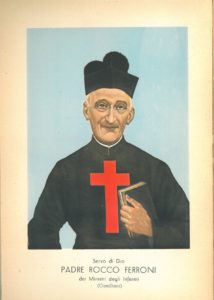 Another aspect of the spirituality of this Servant of God was that he lived the Camillian spirit in a radical way. The fundamental way of living the spirit of the Order was charity, as perfection of the soul and as service to the suffering members of the Mystical Body, that is to say sick people.
Another aspect of the spirituality of this Servant of God was that he lived the Camillian spirit in a radical way. The fundamental way of living the spirit of the Order was charity, as perfection of the soul and as service to the suffering members of the Mystical Body, that is to say sick people.
St. Camillus, for his sons, as the most certain source, required that ‘if someone inspired by the Lord God wants to exercise the works of corporal and spiritual mercy, according to our Institute, he should know that he has to be dead to all the things of this world’.
He has to be dead, that is to say completely detached. This is the fundamental law of religious perfection, a law that was very much inculcated by Jesus, by example and words.
Father Rocco, drawing energy from his life of union with God, journeyed a great deal in detaching himself from his family relatives and from everyone, even though he maintained relationships of cordiality and affection.
With people and with his confreres he had relationships of charity but he was totally faithful to what he had written down: ‘never have too much affection for a person, under any pretext, even that of holiness’. He lived the spirit of St. Camillus in his religious vows: ‘by the vow of poverty is completed and perfected forgoing the world and its possessions’ (St. Camillus).
Father Rocco was so diligent in his observance of the vow of poverty, so faithful in small things, because he was poor in spirit. He was used to look up to heaven, in his silent and humble self-renunciation, and this made him a higher creature, a creature who lived in another world.
From where did he draw so much constancy? Certainly in that constant and profound contact with Jesus whom he beheld made poor for us, who came down to the earth to win souls not things. He was the Teacher of poverty: ‘You are not of this world, why waste your time running after the thousand things of this world which are not yours?’
As a Superior, Father Rocco was vigilant to ensure that poverty was observed, mindful of what the Holy Father had left behind him in written form: ‘We must with all vigilance and spirit conserve the purity of our poverty…because the more poverty is observed ad aunguem, the more will our Institute be conserved’.
By the vow of charity we commit ourselves to forgoing ourselves through the mortification of the body and the senses. The mission of this virtue is to re-establish the early order ‘of loving God so as to triumph over this world, the flesh and Satan’ and this love can only flourish in pure hearts. The pure of heart will see God.
The sender and delicate figure of Father Rocco emanated candour and purity. In his composed and modest approach, in that reserved character of his deeds and words, in that limpid look of his, like a child, there was the scent and the freshness of baptismal innocence. It was enough to see him pass by to be won over. Even that need for cleanliness and order in his person, in things, in the environment in which he lived, was an expression of his interior purity which he knew how to steward with jealous care, equal to the esteem that he had for it.
‘I offer up to Jesus Christ my body and my soul; I want to be completely for him in time and eternity’.
These thoughts well make clear to us why Father Rocco, with regard to chastity, was so pleasantly rigid with himself and with other people: he truly believed that the pure in heart would see God, not only in heaven but also on earth, in that intimate communication by which the Lord makes Himself visible to pure eyes that are fixed only on eternal beauty.
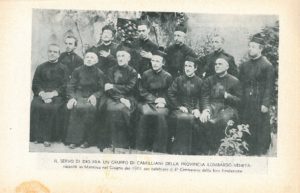 By the vow of obedience we should offer up to God the best and dearest part of us, that is to say our will.
By the vow of obedience we should offer up to God the best and dearest part of us, that is to say our will.
When studying the life of Father Rocco we become convinced that for him the whole of religious life was summed up in obedience. For Jesus, obedience to the Father was the way of carrying out the will of God, and so it should be for man. Understanding obedience was precisely this: doing the will of God. Father Rocco understood his vow of obedience in these terms and thus we are not amazed if he managed to practise it with that perfection that made him worthy of admiration by his Superiors and confreres.
Some people who became his Superiors after being his subordinates related that it was moving to see him present himself to them, by now venerable with years, to ask for some small permission. For Father Rocco, obedience had a sanctifying efficacy because it developed faith in the soul and this is the principle of eternal life, and abandons it to the Holy Spirit in a singular manner. This is an efficacy that is totally singular and which transfuses outwards as well, giving to every act of obedience that character of sweetness, of faithfulness and of spontaneity that are the fruit of love for the will of God.
In addition to the three traditional vows of poverty, chastity and obedience, St. Camillus added another, of whose great value Father Rocco was aware: ‘Service to the sick poor, even if plague-stricken, in their corporal and spiritual needs’. He lived this vow with a fullness of interior and exterior dedication that was exemplary. For him, sick people were sacred people and he drew near to them with a respect and a veneration that also transpired from his external attitude. Sick people felt attracted by the appeal of his interiority and were greatly comforted by it.
Here are some testimonies: ‘He had a preference for the poorest and those most in need. Indeed, he sent his religious to provide care during the night or the day, or simple medications, to poor families, trying to meet all their needs’. ‘I can bear witness with all truth that his behaviour was always that of a saint, especially because of his unfaltering patience with all the sick of that place; he was always ready to deal with all their needs, but not only that – also with all their wishes and desires, not refusing to be disturbed even when he was in church for his prayers, when sick people of both sexes were wont to interrupt him for advice, a blessing or something else; and he used to smile at everyone and made everyone pleased’. ‘He stood at the bedside of the dying for hours and hours without giving way to useless words, but praying’.
Through the fourth vow, Father Rocco placed his life in a state of total dedication to the sick, enriching his spirituality with a fullness that was also human and wonderful.
Everything consists of keeping the soul in an approach of perennial offering, as Father Rocco himself did, through prayers: because there is an intimate relationship between a life of prayer and the solidity of vows.



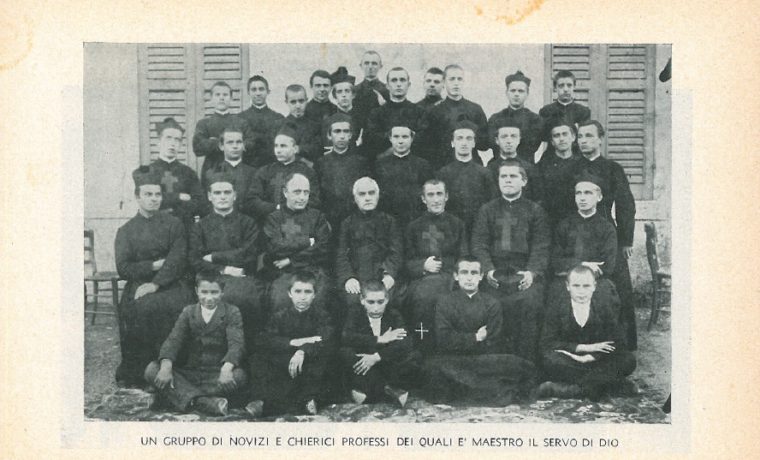
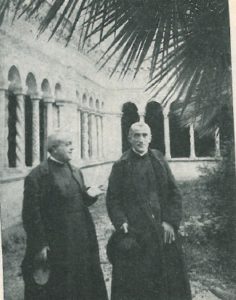





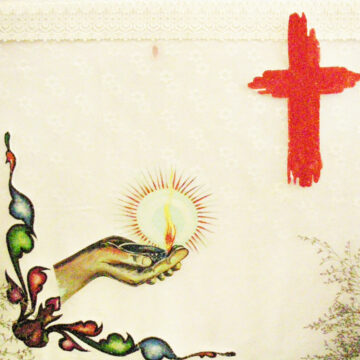
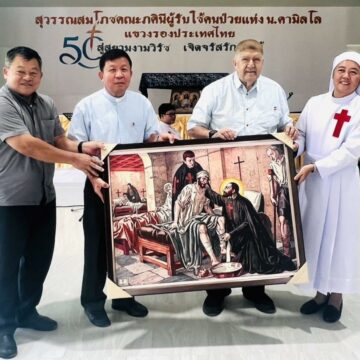
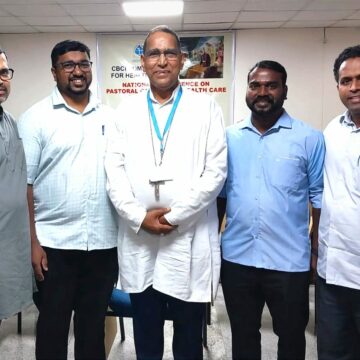
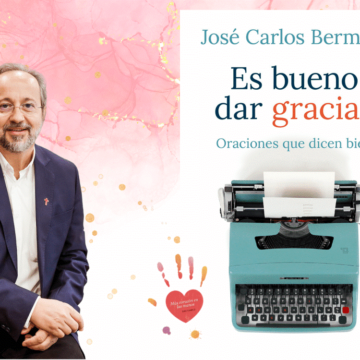

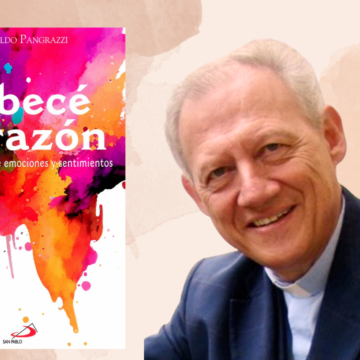
Camillians on Facebook
Camillians on Twitter
Camillians on Instagram